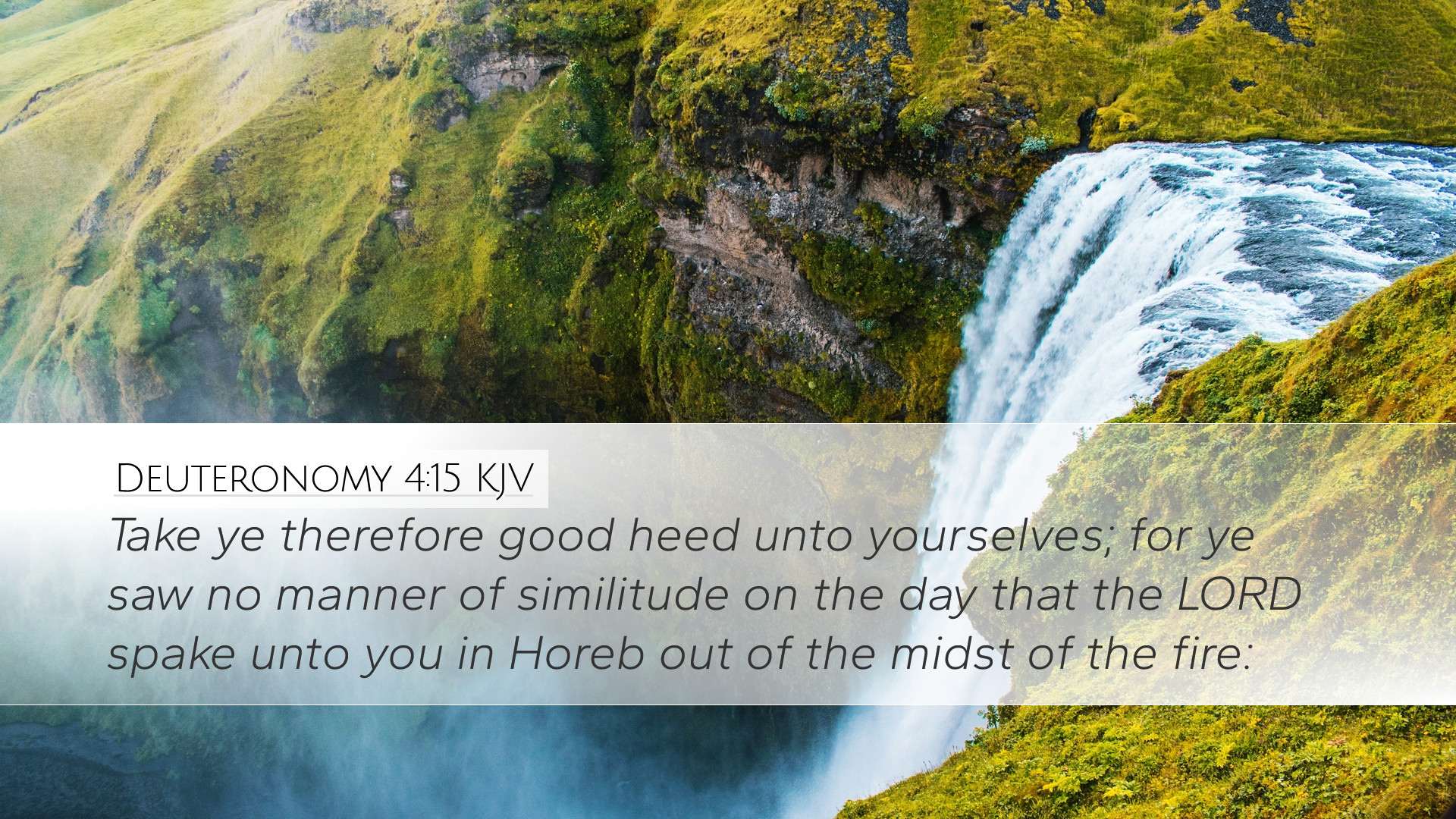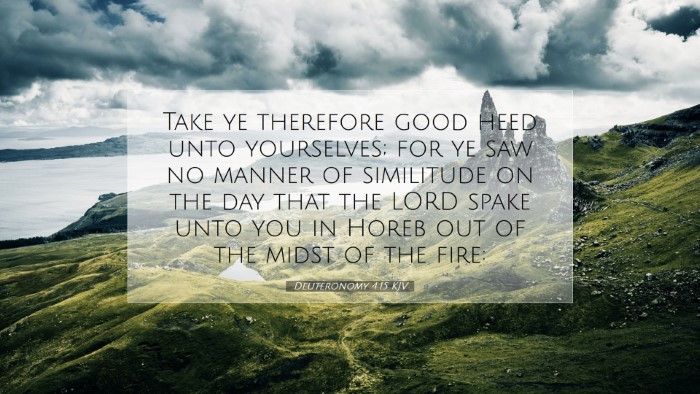Commentary on Deuteronomy 4:15
Text of Deuteronomy 4:15 (KJV): "Take ye therefore good heed unto yourselves; for ye saw no manner of similitude on the day that the LORD spake unto you in Horeb out of the midst of the fire."
Introduction
The exhortation in Deuteronomy 4:15 emphasizes the importance of personal vigilance in faith. This is a call for the Israelites to remember the nature of their experience with God, particularly at Sinai. The verse carries implications not only for the immediate audience but also for contemporary readers seeking to understand the divine character and their own relationship with God.
Contextual Analysis
Deuteronomy is a series of speeches given by Moses, preparing the Israelites to enter the Promised Land. This particular passage underscores God's transcendence and the necessity of adhering to His commandments without the aid of physical representations. This notion is central to Israelite worship and ethos.
Public Domain Commentary Insights
Matthew Henry's Commentary
Matthew Henry emphasizes that Moses urges the people to observe the cautionary principle of avoiding idolatry. He notes that the lack of a visible representation of God at Horeb serves as a divine directive against making images. Henry reflects on the significance of maintaining a pure worship devoid of physical idols, which are unfit for the infinite nature of God.
Albert Barnes' Notes on the Bible
Albert Barnes expounds on the term "good heed" which indicates a careful and attentive observation of oneself and one’s actions. He insists that true worship must stem from a heart understanding and comprehension of God’s essence, rather than through material semblances. Barnes warns that imagery distorts the true nature of the divine, reinforcing the command to worship in spirit and truth (John 4:24).
Adam Clarke's Commentary
Adam Clarke adds an expository note that while the people witnessed miraculous events at Horeb, they were specifically instructed that God has no form or similitude. He highlights how this knowledge should lead to a profound respect and reverence for God’s greatness and holiness. Clarke cautions against the temptation of reducing God to human constructs, which would be an affront to His majesty.
Theological Implications
The implications of Deuteronomy 4:15 extend deeply into theological discourse regarding the nature of God and worship practices. Through the insights from the commentators, we see a unified emphasis on the necessity of understanding God’s essence beyond human representation. Such acknowledgment lends itself to a broader discourse on the nature of revelation and the human response to the divine.
1. The Transcendence of God
The transcendence of God is a crucial aspect of this passage. The lack of similitude signifies that God is unlike anything that can be conceived or depicted. His essence transcends human understanding, drawing believers into deeper inquiry and reverence.
2. The Danger of Idolatry
The verse serves as a stern warning against idolatry, a motif prevalent throughout the Old Testament. This call to vigilance against creating images reflects an ongoing struggle within the community of faith, urging believers to uphold a pure form of worship that aligns with divine revelation.
3. Worship in Spirit and Truth
The principle established in this verse aligns harmoniously with the New Testament teaching of worshiping in spirit and truth. As elucidated in the commentaries, genuine worship arises from an accurate understanding of God’s nature, fostering a personal relationship grounded in honesty and humility.
Practical Applications for Today’s Church
As pastors, students, theologians, and scholars engage with Deuteronomy 4:15, several practical applications emerge.
- Encouragement of Personal Vigilance: The call for personal attention to one’s spiritual life is ever relevant. This encourages believers to engage in self-examination regularly.
- Promoting Education on God’s Nature: Churches can benefit from educational programs that explore the attributes of God, facilitating a deeper understanding of worship devoid of idolatry.
- Creating Safe Worship Spaces: Worship practices should promote an atmosphere that aligns with the principles of reverence and awe before the God who cannot be contained in physical forms.
- Teaching Against Idolatry: Modern idolatry may not always be physical images; it can manifest as the worship of success, materialism, or self. Teaching against these modern idols is vital to maintaining purity in worship.
Conclusion
In Deuteronomy 4:15, we find a pivotal instruction that reaffirms the unique nature of God as well as the appropriate response of humanity in worship. With insights from respected public domain commentators, we are reminded of our continual need for vigilance against idolatry, the significance of true worship, and the profound relationship we are invited to have with our transcendent God.


